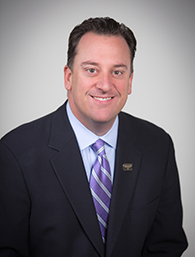Political conversations coaxing COVID-19 vaccine
Creating a vaccine for COVID-19 will have both political and ethical undertones, but there are steps everyone can take to encourage the process, according to Oakland University bioethics professor Mark Navin.

Navin — along with David Dulio, Oakland University political science professor, balanced health and political concerns around a COVID-19 vaccine on Monday, May 18 during the Oakland County Megacast.
While minimizing the spread of COVID-19, executive health orders have made the disease a political and ethical concern across the country. Therefore, creating a vaccine is a priority for several government agencies — the NIH, the CDC, the FDA, ASPR and the U.S. Army — according to President Trump’s recent address.
Although COVID-19 stretches through several government agencies, everyday conversations are something that can help the situation too. These conversations begin with big picture news from political leaders and health officials — then everyone unwraps information differently, according to Dulio.

“People can gravitate to the kind of information that they like and information that confirms what they already believe.” he said. “That plays a part in people being more entrenched in their own views — their own bubble.”
The most “productive” conversations happen when people choose to “read a lot of sources and challenge ourselves,” according to Dulio. He suggested consuming a range of news and trying to understand both sides of the bipartisan conversation.
“We can make better progress when the core values, the essential values are widely shared,” Navin said. “We’re seeing increased political polarization. [There is] increased association of someone’s values and behaviors with political identities.”
He believes safety should not be a “politicized practice,” but there are some health decisions that have a bipartisan divide. Wearing a face mask, social distancing and following other safety measures are becoming politically charged. People are less concerned about traditional values — “liberty, equality or justice” — and more focused on loyalty to their “tribe.” The “tribe” viewpoint could be used positively if people identified themselves within “the people of Michigan or the people of America.”
“I think it’s always a good idea to assume that your opponents in politics are people of good will,” Navin said.
Moncef Slaui, a doctor specialized in vaccine development, assured the American public during Trump’s address that a vaccine would be available by 2020.
The road to that vaccine could be smoother if there is a conversational bridge between political parties, according to Dulio. Additionally, Navin explained prioritizing values “marks differences in Democrats and Republicans” — they don’t have different values, but “we rank them in different ways.” The combination of their views denotes that healthy bipartisan conversations could help the health of the nation.
“Politics are fundamentally about having to get peace and stability and trust. Frankly, peace, stability and trust is a pretty rare thing in the history of humanity,” Navin said. “But we’ve still got something really good. So the No. 1 priority should be to not mess up what we’ve got”












